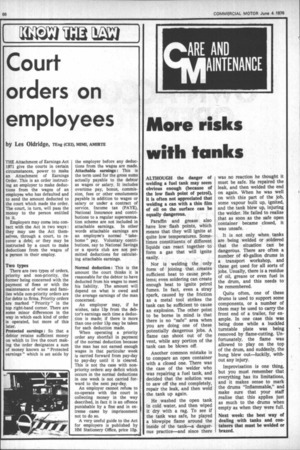Court orders on employees
Page 68

If you've noticed an error in this article please click here to report it so we can fix it.
by Les Oldridge, TEng (CEI), MIMI, AMIRTE
THE Attachment of Earnings Act 1971 give the courts in certain circumstances, power to make an Attachment of Earnings Order. This is an order instructing an employer to make deductions from the wages of an employee who has defaulted and to send the amount deducted to the court which made the order. The court, in turn, will pass the money to the person entitled to it.
Employers may come into contact with the Act in two ways : they may use the Act themselves, through a court, to recover a debt; or they may be instructed by a court to make deductions from the wages of a person in their employ.
Two types There are two types of orders, priority and non-priority, . the former being concerned with the payment of fines or with the maintenance of wives and families while non-priority orders are for debts to firms. Priority orders are marked "Priority " in the top right-hand corner. There are some minor differences in the way in which each kind of order is operated, but more of this later.
Protected earnings : So that a debtor retains sufficient money on which to live the court making the order designates a sum of money known as " Protected 1 earnings" which is set aside by
the employer before any deductions from the wages are made. Attachable earnings : This is the term used for the gross sums actually payable to the debtor as wages or salary. It includes overtime pay, bonus, commission, fees or other emoluments payable in addition to wages or salary or under a contract of service. Income tax (PAYE), National Insurance and contributions to a regular superannuation scheme are not included in attachable earnings. In other words attachable earnings are an employee's normal " takehome " pay. Voluntary contributions, say to National Savings or a sports club are not permitted deductions for calculating attachable earnings.
Normal deduction : This is the amount the court thinks it is reasonable for the debtor to have deducted from his wages to meet his liability. The amount will depend on what is owed and the average earnings of the man concerned.
An employer may, if he wishes, take 13p from the deb tor's earnings each time a deduction is made; if there is more than one order 13p may be taken for each deduction made.
When operating a priority order any shortfall in payment of the normal deduction because the man has not earned enough wages in that particular week is carried forward from pay-day to pay-day until it is cleared. This is not the case with non. priority orders: any deficit which occurs in the normal deductions in one week is not carried forward to the next pay-day.
An employer cannot refuse to co-operate with the court in collecting money in the way described, in fact it is an offence punishable by a fine and in extreme cases by imprisonment not to do so.
A very useful guide to the Act for employers is published by HM Stationery Office, price 15p.




























































































































